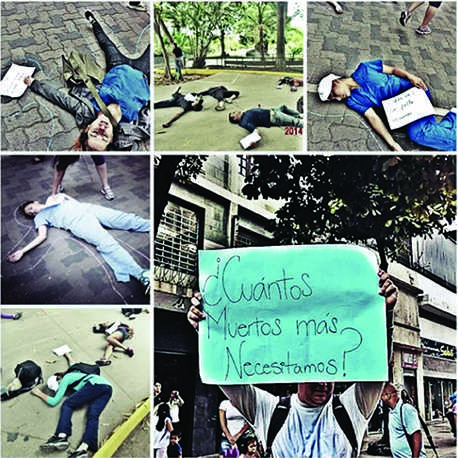Rummel Medina
April 29, 2014

Senior Rummel Medina’s parents listened to the warnings that were spreading in Venezuela. The country would not be safe for children to grow up in, so they accepted the job offers in America and left their homeland in 2004. Medina was only in second grade, but he still remembers the dwindling sense of security.
“There was a month in my childhood where school was constantly opening and closing along with my parents’ work,” Medina said. “I’m not surprised that this is finally happening because things have been bad there since before I was born.”
Medina’s paternal side is currently living in Venezuela and experiencing the protests and violence first hand.
“For me it’s my family, my family is over there, and I still have old friends that I used to know there. Everyday I am thinking my family could be at one of these protests and they can get shot or robbed because there are no more guards securing neighborhoods,” Medina said.
His cousins are affected daily by opposition protests against the Venezuelan government. Medina’s younger cousin, Jonathan Collette, is a proactive voice in the protests, and Christine Collette has been unable to attend high school for three weeks.
“Jonathan Collette actually knew someone who was shot and killed in the first couple days of the protest,” Medina said. “It really worries me because the people who are very proactive in these protests end up shot, killed or imprisoned, maybe even tortured. Christine is planning to transfer to a university here in the United States but she can’t get her credits if she isn’t going to school. She is being impacted in the sense that she can’t get her education.”
Although Medina hasn’t lived in Venezuela since his childhood, he is still being impacted by the upheaval in his former country.
“Venezuelans all over the world should be impacted by this because whether they live there a few months or a couple years, it’s still their home,” Medina said.
Overall, like protesters around the world, Medina supports the cause to raise awareness of the situation in Venezuela.
“The biggest thing we can do, not being in Venezuela, is to let the people know what is going on,” Medina said. “The more that everyone world wide understands what is going on in Venezuela, the more pressure it is going to put on the Venezuelan government to figure themselves out.”
Text message after text message pop up on seniors Maria Solano and Valentina Archilla’s phone from family members and friends in Venezuela reading “Gather your friends and bring posters; there is going to be a protest today.”
And with a quick buzz, they are flushed with anxiety and stress. They pray for the protection of their active family members and friends.
“Its really stressful having them there because you don’t know if they are okay just walking on the street because [the national guard shoots] random people,” Archilla said. “There are millions of videos where there is a person walking and they come and they shoot you and they start beating you and that could be any of our families. And plus since the main protesters are students, they are our friends. Our friends there don’t care they are just trying to fight for their county. It makes it more stressful becaue it is their safety they are risking.”